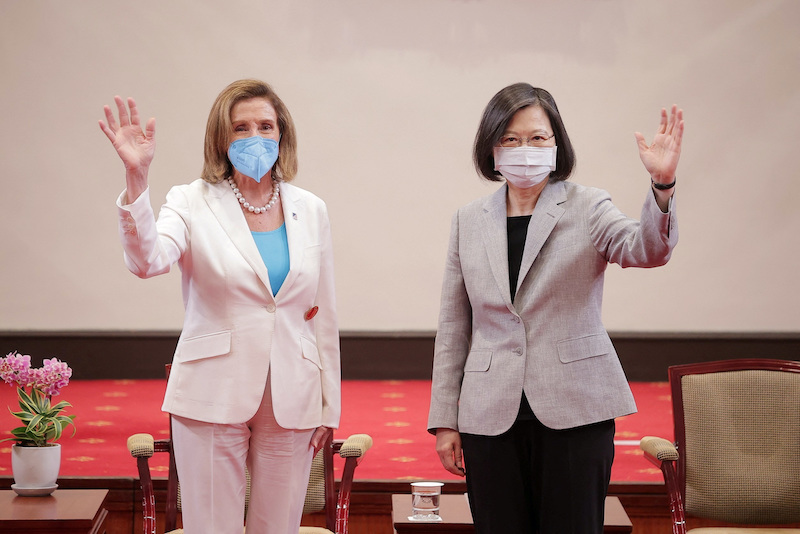China suspended imports of fruit and fish from Taiwan on Wednesday and halted exports of natural sand to the self-governed island as it hosted US House of Representatives Speaker Nancy Pelosi.
Customs officials had flagged retaliatory measures ahead of Pelosi’s visit by suspending imports from 35 Taiwanese exporters of biscuits and pastries since Monday.
China’s Commerce Ministry said exports of natural sand – widely used for construction and in concrete – to Taiwan were suspended from Wednesday. The move was based on laws and regulations, the ministry said, without elaborating.
China also halted imports of citrus fruit, chilled white striped hairtail and frozen horse mackerel from Taiwan from Wednesday, which it said was due to pesticide residue found on citrus fruit, while traces of the novel coronavirus were allegedly detected on the packaging of some frozen fish products in June.
China’s top food and agricultural imports from Taiwan include seafood, coffee, dairy products, beverages and vinegar.
In January-June, China’s biggest agricultural and food import items from Taiwan were fish and other aquatic invertebrates, reaching 399 million yuan ($59 million).
Earlier this year, China suspended imports of grouper fish from Taiwan, saying it had detected banned chemicals. Last year, Beijing also suspended pineapple, sugar apple and wax apple imports from the island, citing pest concerns.
ALSO SEE: TSMC Shuts if China Invades Taiwan, Says Boss – Focus Taiwan
Foundations, Companies Also Targeted
China also vowed to take “disciplinary actions” against two Taiwan foundations which it claimed had aggressively engaged in pro-independence separatist activities.
The two foundations – Taiwan Foundation for Democracy and Taiwan Foreign Ministry’s International Cooperation and Development Fund – will be banned from cooperating with any organisations, companies and individuals in the mainland, China’s state news agency Xinhua said on Wednesday, citing Ma Xiaoguang, spokesman of China’s Taiwan Affairs Office.
China would punish any mainland organisations, companies and individuals that provide financial support to or serve the two foundations, Xinhua reported, adding other measures will be adopted if necessary.
In addition, any deal or cooperation between four specific Taiwanese firms and mainland companies are not allowed due to their donations to the two foundations.
Executives at the four Taiwanese companies – solar producer Speedtech Energy Co, Hyweb Technology Co, medical equipment producer Skyla, and cold chain vehicle fleet management company SkyEyes – will be prohibited from entering mainland China.
Live Fire Drills
Pelosi’s arrival on the island late on Tuesday, which China considers a breakaway province, prompted a furious response from Beijing at a time when international tensions already are elevated by Russia’s invasion of Ukraine.
China announced drills in six locations surrounding Taiwan soon after House Speaker Pelosi – a veteran China critic and the third most senior US politician – landed in Taipei on Tuesday night.
Chinese military, naval and airfare units are staging an unprecedented six days of military drills surrounding Taiwan, a move which security analysts say could escalate even if Beijing wants to avoid sparking a full-blown conflict.
Taiwan officials said the live fire drills violate United Nations rules, invade Taiwan’s territorial space and are a direct challenge to free air and sea navigation.
On Wednesday, a multi-force exercise involving the Navy, Air Force, Rocket Force, Strategic Support Force and Joint Logistics Support Force took place in the air and sea to the north, southwest and southeast of Taiwan.
Yuan Weaker
Meanwhile, the Chinese yuan weakened on Wednesday amid tensions over Pelosi’s visit.
The People’s Bank of China set the midpoint rate at 6.7813 per dollar prior to the market open, weaker than the previous fix 6.7462.
In the spot market, the yuan opened at 6.7585 per dollar and was changing hands at 6.7515 at midday, 15 pips weaker than the previous late session close.
“Asian markets are likely to trade sideways watching the US-China developments,” OCBC Bank said in a note.
China’s foreign ministry said it lodged a strong protest with the United States, saying Pelosi’s visit seriously damages peace and stability in the Taiwan Strait, while China’s defence ministry said its military has been put on high alert and will launch “targeted military operations” in response.
The risk of escalation once Pelosi leaves the region would be the immediate focus for markets, said Stephen Innes, managing partner at SPI Asset Management.
“Beyond the military theatre, the issue to watch once Pelosi returns to the US will be whether the White House talks tough on China.”
Capital Outflow Pressure as Fed Flags Rate Hikes
The US dollar index eased on Wednesday following a jump overnight, with Federal Reserve officials talking up the potential for further, aggressive interest rate hikes.
On Tuesday, San Francisco Fed president Mary Daly and Chicago Fed president Charles Evans signalled that they and their colleagues remain resolute and “completely united” over getting rates up to a level that will more significantly curb economic activity.
“After all, recent Fed’s speeches suggested that the tightening cycle was far from over before restoring price stability,” Ken Cheung, Chief Asian FX Strategist at Mizuho Bank, said.
“Considering that monetary policy divergence between China and the US might continue, China will still face relatively large capital outflow pressure, weighing on the yuan,” wrote Zhang Ming, senior economist at the Chinese Academy of Social Sciences, in a note.
Zhang expected the currency to remain between 6.6 and 7.0 against the greenback in the second half of 2022.
The global dollar index fell to 106.063 from the previous close of 106.241. The offshore yuan was trading at 6.7605 per dollar.
- Reuters with additional editing by Jim Pollard
ALSO SEE:
Taiwan Says China Attack ‘Worse Than Ukraine’ for Supply Chains
US May Slip Into Recession if Taiwan Chip Link is Cut – CNBC
Taiwan Chipmaker TSMC’s Shares Rise on Second Quarter Profit
Taiwan Hints US-Like Relations with EU May Spur Chip Plants
























